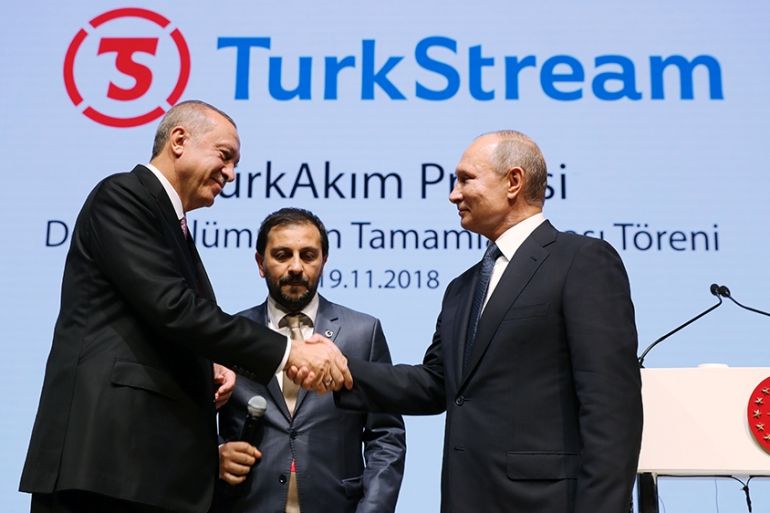Washington encouraging Ukraine to sabotage last remaining pipeline carrying Russian gas into the EU, claims Moscow.

Russia has accused the United States of seeking to sabotage TurkStream, the last pipeline carrying Russian gas exports into Europe.
Russia’s Foreign Minister Sergey Lavrov alleged at a news conference on Tuesday that Washington is encouraging “terrorist” attacks on his country’s energy infrastructure, and claimed there are plans to target TurkStream.
“The US does not tolerate competition in any sphere, including energy. They are recklessly endorsing terrorist activities aimed at undermining the energy stability of the European Union,” Lavrov said, according to Turkiye’s Anadolu news agency.
“They are encouraging their Ukrainian proxies to disable TurkStream following the sabotage of Nord Stream,” he added.
Russia said on Monday that it had downed nine Ukrainian drones that had tried to attack part of TurkStream’s infrastructure.
The pipeline is the last carrying Russian gas into the EU after Ukraine refused to renew a transit contract that expired at the end of 2024. The halt on that route has further disrupted EU unity on the war, with Slovakia claiming it will cause a crisis and threatening to block EU support for Kyiv.
Russia called the targeting of the pipeline, which runs beneath the Black Sea to Turkiye before sending gas onwards to Hungary and Austria, an “act of energy terrorism”.
Kyiv has not commented on the report yet.
Moscow has accused US-backed Ukrainian agents of sabotaging Nord Stream. The pipeline beneath the Baltic Sea blew up in September 2022.
Massive air attack
Ukraine launched a “massive” air attack hitting multiple targets in Russia overnight on Tuesday, according to media reports in both countries.
Hundreds of drones and missiles were fired, with industrial facilities damaged and schools forced to close in at least three cities.
The Shot Telegram channel said Russia had downed more than 200 Ukrainian drones and five US-made ATACMS ballistic missiles.
The head of Ukraine’s official Centre Against Disinformation, Andriy Kovalenko, told Ukrainian TV on Tuesday that the strikes had targeted weapon production plants, oil refineries and warehouses in Engels, Saratov, Kazan, Bryansk, and Tula.
In the energy-rich region of Tatarstan, a drone hit a gas storage tank, sending flames and thick smoke billowing towards the sky near the city of Kazan, according to the media and the regional government.
In Engels, more than 600km (373 miles) southwest of Kazan, a “massive drone attack” damaged two industrial sites, regional Governor Roman Bussargin wrote on Telegram.
Schools in Saratov and Engels would hold classes online because of the attacks, he added.
Alexander Bogomaz, the governor of the Bryansk region in western Russia, said Ukraine had launched a major missile attack but did not say which missiles had been used.
Flight restrictions were imposed at airports in Kazan, Saratov, Penza, Ulyanovsk and Nizhnekamsk, Russia’s aviation watchdog said.
Russia‘s Ministry of Defence did not immediately comment on the attack or the weapons used.
Trump incoming
Ukraine fired US-supplied ATACMS and British Storm Shadow missiles into Russia on November 21 last year, prompting Moscow to respond by launching a new intermediate-range hypersonic ballistic missile, known as “Oreshnik” or Hazel Tree, at Ukraine.
Russia and Ukraine have upped their strikes on each other before US President-elect Donald Trump’s inauguration on January 20.
Ukraine’s air force reported on Tuesday that it had shot down 58 out of 80 drones launched by Russia over 11 regions overnight.
Trump has said he aimed to stop the nearly three-year conflict and each side wants to be in the strongest negotiating position before the new US administration begins any talks on ending the conflict.
Uncertainty hangs over the president-elect’s plans for Washington’s support for Ukraine. However, Trump is also eager to persuade European nations to buy more US liquefied natural gas (LNG) – a quest that a further reduction of Russian gas supplies could help.